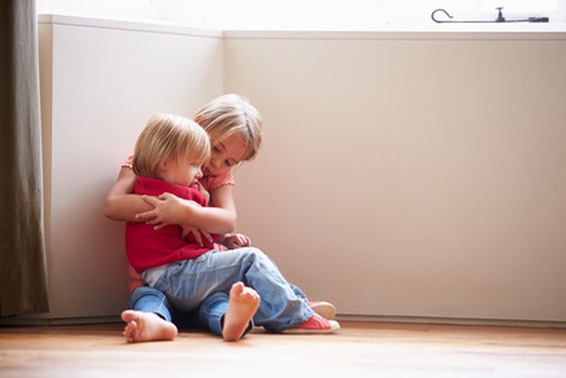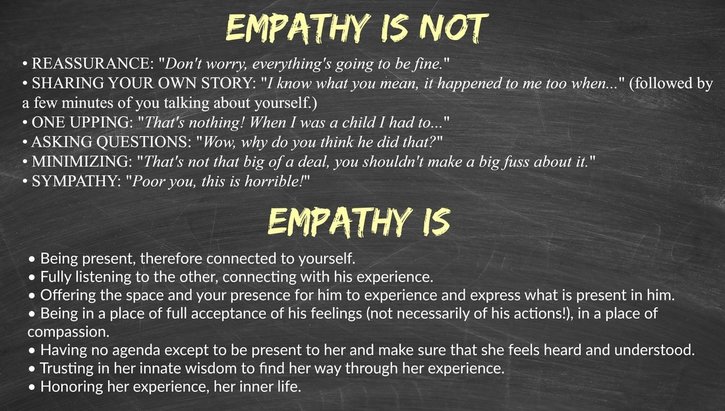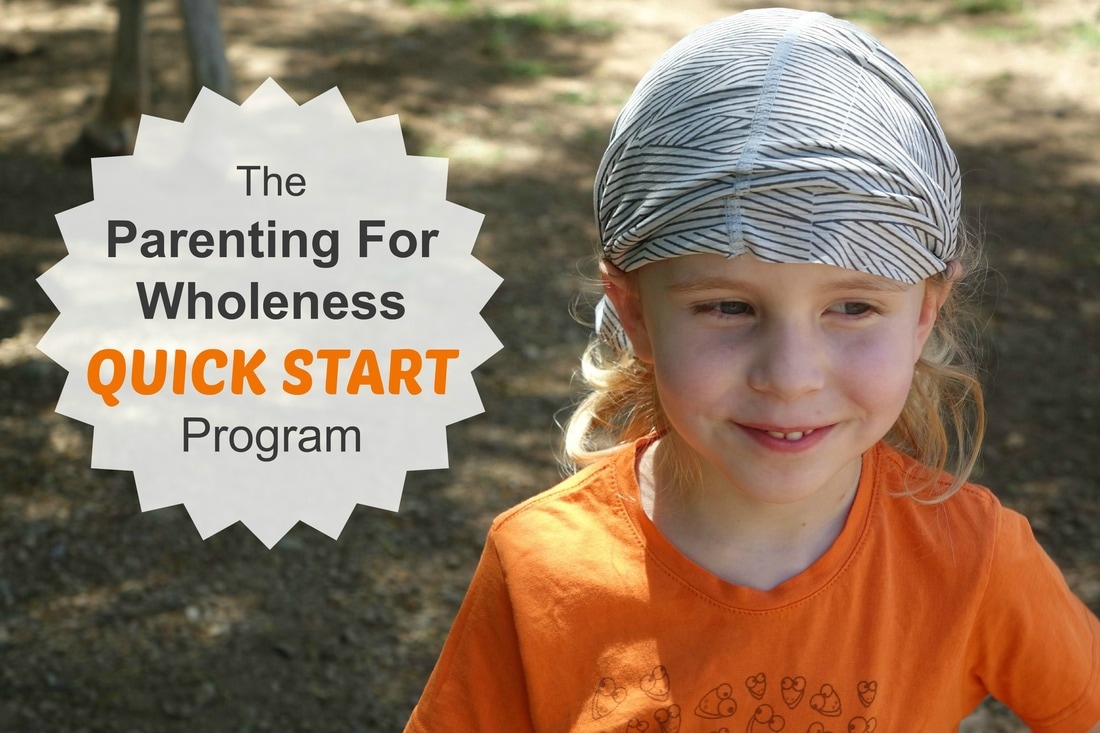What if one simple shift could make a huge difference in your family life? AND make your life a whole lot easier?
Read or listen to the audio version.
I realized recently that there's an area where parents are working much harder than they need to. Where putting in less effort would greatly benefit their family! Isn't that a nice thought?!? This realization came last Sunday during a presentation I was giving on "The Essential Principles I've Adopted From NVC (Nonviolent Communication.)" One of the key NVC teachings* I've integrated in my life and teach parents is empathy. (I'll get to the simple tip later, once I've laid the foundation for it.) Learning to truly empathize with your children is one of the most powerful parenting tools you can develop, one of the 4 parenting pillars I consider essential to have ease and harmony in your family while raising whole and happy children. (Click here for a report that covers all 4 pillars of Clean Parenting™.) What IS empathy? Let's start with what it's not. Empathy is not:
Take a moment to ask yourself how you feel when someone interacts with you in any of those ways. Think of a time when you were upset and sit with each of the responses. Now let's move on to what it is. Empathy is:
Empathy is mostly a way of being, not something you do. It's a skill that can be cultivated and which will bring you benefits you may not even be aware of, not only in all your relationships but in your relationship with yourself and in the quality of your inner life. I experience it as a social meditation. When you empathize with your children you give them full permission to be who they are and to have the experience they're having. You support them in connecting with their experience and offer the space for them to process it organically. You support them in finding their own innate wisdom. You offer them a natural tool so that they don't carry their unprocessed experiences into the future. Empathy diffuses conflict and prevents resistance and rebellion. It supports children in becoming self connected, authentic, feeling worthy and being able to find their own solutions and process their experiences on their own. One note here is that it's absolutely okay if your children cry. In fact it often can happen if they feel true empathy from you. Tears are a powerful way in which experiences get processed. The deeper your children go into the emotion, the more processing is happening. All you have to do is stay with them, perhaps holding them, until the emotion through the tears has passed. If we engage with words, it's only for the purpose of allowing them to more deeply connect with their experience, so that they can organically move through it, through the innate wisdom of their being. There is a lot that can be said on communicating from a place of empathy, but for now I'll just offer one guideline. If you want to speak from a place of empathy, make your goal to have your words match their experience. You can use any words that will allow them to more fully connect with what they're experiencing. If you get an emphatic "YES!" in response to something you say, you'll know that it's what you're doing.
So are you still wondering what I was referring to in the title of this article?
Here it is! I noticed throughout my call on Sunday that some of the moms were intently trying to figure out how to communicate with their child, how to help them, what to do. I could feel their tension and the intellectual effort of trying to figure it out. And it was obvious what they needed to hear: You don't need to do or say ANYTHING!!! All you need to do is BE with your child. Relax, love, don't try to fix anything, just be. Can you feel that? Can you find that place? Close your eyes and find it. Feel it. Let it permeate you so that you can remember it and draw upon it when needed. It's SO easy! And feels good. It's connecting. Relaxing. Natural. And a beautiful gift to give others. You just need to unlearn your habit of needing to do something, let go of the belief that you help by doing. Last night, in the midst of writing this article, I had to stop for a weekly coaching call with one of the delightful moms in my group. At some point during our call her 6 year old daughter walked in, upset. Caroline picked her up lovingly and placed her in her lap. Her daughter was crying and all Caroline provided was complete allowance of her experience, love and compassion. At times she would still talk with me while snuggling her daughter. After just a few minutes, she directed her to go re-join her dad, which her daughter did easily. Caroline didn't overtly DO or say anything to make her daughter feel better. But from my vantage point I could feel the love, acceptance, compassion, peace and the relaxed energy in Caroline. I wish I had a video of it to share with you. It was sheer beauty and the exact attitude I know to be profoundly impactful on our children. *I am NOT a certified NVC teacher, though I have studied it extensively. I want to make it clear that what I teach is my interpretation and integration of NVC, NOT the pure NVC principles.
To read about all four of the core principles of Clean Parenting™, request my FREE report: The Almost Magical Formula for surprising EASE and HARMONY in your family while fully honoring your children’s spirits. When used together, those four principles truly lead to astounding ease and harmony in families (empathy is the fourth one.)
WANNA GIVE BACK? Did you get value from this article? If so I would be incredibly grateful if you could share this article with your friends on Facebook (below) or Pinterest. I would LOVE help spreading the word about my work to people who could be positively impacted by it!
SUGGESTIONS: If you liked this article, you'll likely also enjoy:
20 Comments
Lenka
4/2/2014 08:02:36 am
Dear Eliane,
Reply
Eliane
4/2/2014 09:49:59 am
Lenka,
Reply
Lenka
4/2/2014 07:40:26 pm
Yes, it does make sense. I was thinking about it too, just don´t know how to emphatize in this case. I often find it very difficult to find the right words to name the feelings and needs even when those are mine. Your article is so true!
Reply
Eliane
4/2/2014 10:28:04 pm
One thing I did for years was to keep a printed list of NVC feelings and needs handy. I would reference it several times a day, until it got integrated in me.
Krissy
6/4/2015 12:49:02 am
I too find it difficult to find the right words to name feelings and needs.
joanna
3/9/2015 05:34:48 pm
Eliane,
Reply
Eliane
3/9/2015 11:38:35 pm
The list I had was about 4 pages long, and I'd received from an NVC training. Here are links to a list of needs and a list of feelings, created by Bay Area NVC:
Reply
Christine
12/6/2015 03:59:13 am
Thanks, Eliane! This was a good reminder to watch out for, especially as my daughter is two now and protesting quite often. I noticed that I can be calm and empathic easily when my energy stores are filled, but get impatient quickly when I'm low on energy. It's quite frustrating.
Reply
Eliane
12/6/2015 09:13:05 am
This proves how important it is that you care for your own needs as well, isn't it? If that's not solidly on your radar, you may want to read the following article: The Biggest Mistake The Most Caring Moms Make ► http://tinyurl.com/oe298vh.
Reply
Christine
12/6/2015 11:26:48 am
Thanks, Eliane. I reread that one just yesterday and also ordered the NVC book. I'm working on having my needs met but it isn't easy while also working full-time. And after two years of neglecting myself I get to the end of my energy stores very quickly these days. Not happy about it but doing what I can.
Eliane
12/6/2015 07:41:46 pm
Yep, you're right, it's not easy to create a life where your needs are met, after years of ignoring them. But if we commit ourselves to it, we can eventually get there. Best of luck to you in it! And enjoy the book!
Reply
Christine
12/7/2015 01:40:16 pm
Thank you, Eliane!
Reply
Dear Elaine,
Reply
Eliane
1/14/2016 05:22:23 pm
Thank you, Nirupama!
Reply
Brittney
6/28/2018 03:26:56 pm
Thank you! The recording was so very simple and helpful. I am having hard time with my 5 year old who cannot seem to get to the other side of his frustrated feelings when he cannot master something, his bike, getting the ball in the hoop, etc. He will whine, tense up, tantrum, grunt, sometimes for an hour or more. I’ve tried all the ropes, validating, empathizing, being present. He just can’t seem to move on. For instance I was at the park with my kids, him, 3 year old, and baby. He was trying to get the basketball in the funnel ball hoop. He could not do it he is too small and I could not help him. Especially being as frustrated with himself as he was. His tantruming and frustrations lasted for over an hour before I had to take the ball away for pushing his brother, he could not play, do any other acivIties on the playground. So we had to leave to the dismay of my other child. My 5 year old was so frustrated and devasted we were leaving like he has lost track of time that he’d missed playing because tantrummed for over an hour. I felt extremely helpless and bad for him because it honestly seems he cannot get over it. He wasn’t seeking attention but I just notice this shame and disappointment with himself that leads to the utter frustration. None of my efforts to integrate him into other play were successful. He does this kind of thing often. He fixes on an idea or concept and CANNOT move on. I even wonder if there are some OCD symptoms present. Anyways, any thoughts would be greatly appreciated!
Reply
Eliane Sainte-Marie
3/9/2021 07:13:40 am
Thank you! ♥
Reply
Clara
11/17/2023 10:23:37 am
6 Empathy
Reply
Alisha
12/23/2023 05:31:12 pm
Hi Clara! Thank you for taking the time to comment. Know that you are not alone. It makes all the sense in the world that when we are outside of our window of tolerance it will be a lot harder to access our patience, our loving kindness, and our empathy. We ourselves might be in a place where we could use some empathy. Those moments where we feel overwhelmed will always be a part of life. BUT...they can start happening a lot less the more we create a life that keeps us within our window of tolerance. Eliane wrote an article on this concept and it can be key in keeping us thriving and not at the edge of an adult sized meltdown. Much love to you!
Reply
Leave a Reply. |
PARENTING FOR WHOLENESS
HOME BLOG PROGRAMS CLEAN PARENTING™ PROGRAM QUICK START PROGRAM CONTINUUM CONCEPT WHAT IS CLEAN PARENTING™? © 2021 PARENTING FOR WHOLENESS |
|



